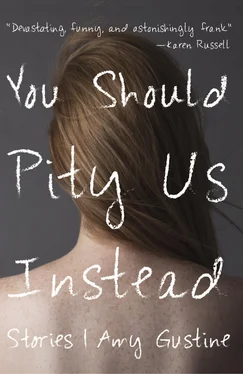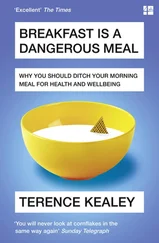Norma pushed herself out of the car using the doorframe. Only when she was pulling herself up the porch steps by the rail did it occur to Shayla she should have helped her. Shayla rolled down the window. “You okay, Mom?”
Her mother lived on a busy street and couldn’t hear over the traffic noise. She’d made the porch landing and was fumbling for her keys. Shayla watched, feeling the moment stretch to breaking. Get out now? Offer to help now? It’s too late. But she’s still fumbling. Shayla had just cracked the door, the dome light blinding her a moment, when Norma found her key. By the time Shayla reached the sidewalk, her mother had disappeared inside.
•
Norma had metastases. They showed up as the classic black hand in her cerebellum. Mike left the images on his screen and went back in to finish getting Fawn ready for bed. He’d left her on the toilet, so he tapped at the closed door. “You okay? Need any help?” He could hear the clink of the toilet paper dispenser followed by a flush.
“Fawn, I’m coming in, okay?”
Still sitting, she looked up at him, the unpatched, good eye stretching to a perfect circle, eyebrow raised.
Oh no, he thought, not this again.
“Who are you?”
“Fawn, it’s me, Mike, your husband. You know that.”
“What are you doing here?”
“I live here, silly.”
“Right,” she scoffs.
“It’s time for you to go to bed.”
“How do you know?” Pulling away from his reach, she banged her elbow against the wall. “Ouch! You made me hurt myself.”
“I know, I know. I’m sorry. Here, let me see it.” He inspected the elbow, just to be sure, pressing on the bone. “Does that hurt?”
“Of course that hurts. You are pushing on it, Mike.”
Good. She knew who he was again.
He got her to a stand, underwear up, and into bed, first removing her eye patch and then fitting the latest gadget in her mouth, a guard that kept her tongue flat and her teeth aligned, supposedly to prevent sleep apnea, which he’d read could be the cause of severe fatigue. Since the stroke he’d been chasing his own tail, going at each symptom — crossed vision, nausea, headaches, confusion, fatigue, ataxia, forgetfulness — only to discover none of the devices or exercises made any difference. What helped was treating Fawn like a child. She had to be fed, exercised, bathed, and napped on a tight schedule. Early on, he’d hired caregivers, but Fawn didn’t like them, and after the third one she refused any more. By then she could get herself to the kitchen and the bathroom, so he had the cameras installed and kept the feed up on his laptop almost all the time.
Mike had left his cell in his study. It rang while he was arguing with Fawn about her pillow. The sleep doctor had recommended a foam one to keep her head at the right angle, but Fawn preferred her old feather pillow.
“Dad?” Rebecca knocked lightly, then pushed open their bedroom door. “It’s some doctor. Dr. Clayton?”
“I’ll call her back,” Mike snapped and Rebecca withdrew, looking hurt. He heard her mumbling shyly to Shayla and a bolt of rage went through him.
Fawn began to cry. His tone must have upset her. “Who was that? Who was calling?”
“Just another doctor. Her mom had a brain CT.”
“Is it okay?”
“Mets,” Mike said, not thinking.
“Oh, that’s terrible.” Fawn began to cry harder, her breath coming shallow and catching in her throat. It was odd, the things she seemed to understand and the things that seemed to have escaped her permanently. “Mets” still meant something, yet she wouldn’t know if she herself had it. Mike could keep it from her, ignore symptoms. If he wanted to.
“It’s all right. She’s very old.”
“Oh, oh.” Fawn grabbed hold of this. “We all get old. We have to die when we are old. What can you do? You have to die.”
“That’s right, honey. And she’s very old.” Mike wiped the tears from Fawn’s face with a tissue and helped her slide down in bed.
“Thank you,” she said. “I love you, Mike.”
“I love you, too.”
As he started to close the door she said, “I’m thirsty.”
He didn’t like to give her something this late. She’d have to get up in the night and he’d have to get up with her. Hampered by fatigue and the dark, or the shock of a light turned on, she was too unsteady to go it alone.
“How about a sip of water?”
“No, I want Pepsi. Pepsi with a straw. I like the straws.”
“I know you do, honey.” He closed the door, thinking he’d give her a few minutes. Maybe she’d forget and fall asleep.
While Shayla waited for Mike to call back, her skin began to itch. It was a psychological reaction to being embarrassed. She’d always had it, assumed everyone did until it came up during her psychiatry rotation in med school. To calm herself, she poured a glass of wine and flipped through a clothing catalogue. What was he doing? How long did it take to read a CT? She had another glass, then called her ex-husband.
“My mom might have brain cancer.”
“Oh shit, I’m sorry. That’s terrible.”
Her ex hadn’t wanted kids, and Shayla was busy enough with work that this struck her as a reasonable life choice. He’d remarried quickly, though, and now had a one-year-old. Did that mean he’d changed? Been pressured? Or realized it was only Shayla he didn’t want? She wished she could ask, and was glad not to know. And she was embarrassed to have called him. Her mind, soft with wine, didn’t know this. Her skin did, though. She had a wicked itch on her upper arms.
“I just thought I should tell people,” she said, “so it’s not such a shock if it turns out it’s bad. I mean, I didn’t want you to open the paper some day and see her obit.”
Shayla cringed, hearing too late, even with an ear callused by daily contact with breast cancer patients, how cold she sounded.
“You okay? You want me to come over?”
“No, I’m all right. I just took Mom home and I’m making some calls, and I knew you’d want to know.”
“Of course I do. Sure. Norma’s a great lady. Do you need something? Anything I can do?”
Shayla could hear a TV and a baby in the background. It was after eight, so it might be his baby, or a TV baby.
“No. No, I have some more calls to make. Maybe I’ll send around an email or something. Keep everybody updated.”
But Shayla couldn’t think who everybody was. Her brother, of course, whom she would call once she knew something definite. And Norma’s sister, Aunt Polly. Shayla’s father had died of a heart attack five years ago and her grandparents were long gone. Cousins? On her father’s side they didn’t keep up, and Aunt Polly would take care of the others. Norma had friends, but Shayla wouldn’t presume to tell them, and come to think of it, didn’t know their last names, couldn’t have contacted them anyway. If Shayla called her own friends, it would only be for pity, not because they had to know.
Still, there must be someone. Shayla poured a third glass of wine. When she finished it, she’d concluded no, there really wasn’t.
Suddenly she felt very tired. Wanted to go to bed, to wait until tomorrow to know, but that was unacceptable. She’d just have to stay up until Mike called. His daughter had sounded very sweet, and that simple exchange they had—“Is your Dad home?” “Sure, may I tell him who’s calling?”—had brought her heart into her throat and Shayla didn’t know why. She really, truly had been fine with no kids. Was still, when she thought about it, fine. That wasn’t the problem. The problem was something else.
Mike put in a load of laundry, then sat at his desk looking at the black hand, a dark gray mass with fingers separated by white matter. Shayla’s mother was dead. Four, five months maybe. They’d radiate to reduce brain swelling, which would buy her lucidity and mitigate the headaches.
Читать дальше












